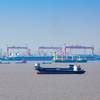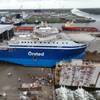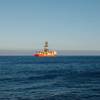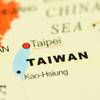IMO Secretary-General Efthimios E. Mitropoulos has highlighted both the environmental and the economic threat posed by the carriage of micro-organisms around the world in ships' ballast water and has called for a balanced approach to the environmental concerns identified, related economic considerations and the safety of life on ships in his opening remarks to a Diplomatic Conference to adopt an international convention on ballast water management for ships.
The carriage of ballast water is essential to the safe operation of ships, but it also poses a significant environmental threat as literally thousands of microbes and marine organisms are routinely ingested into ships' ballast tanks. When discharged into new environments away from their natural habitat, these organisms may become invasive, severely disrupting the native ecology and seriously impacting on the economy and human health of the region of their migration. The global economic impact of invasive marine species has not been quantified yet but is thought likely to be in the order of tens of billions of US dollars a year.
Mr. Mitropoulos told delegates to the meeting, which opened today (9 February 2004) at IMO's London Headquarters, "The introduction of harmful aquatic organisms and pathogens to new environments has been identified as one of the four greatest threats to the world's oceans. Proper control and management of ships' ballast water is therefore a major environmental challenge for IMO and the global shipping industry." He added, "Given the international nature of shipping, the only way to effectively address the identified problems is through the adoption and implementation of a global legally binding instrument - which is what has brought us here together this week."
The proposed new instrument is being developed on the basis of a two-tier approach.
Tier 1 includes requirements that would apply to all ships, including mandatory requirements for a Ballast Water and Sediments Management Plan, a Ballast Water Record Book and a requirement that new ships carry out ballast water management procedures to a given standard. Existing ships would be required to do the same, but after a phase-in period.
Tier 2 gives Parties the option to take additional measures before ships would be allowed to enter their ports. Such additional measures are subject to criteria set in the draft convention and to IMO guidelines yet to be developed, and may also include additional controls applicable to discharge and/or uptake areas of ballast water.
The Conference marks the culmination of many years of work by the Organization to address the issue of ballast water management. It was in 1988 that Canada first reported on invasive marine species in the Great Lakes. This was followed soon afterwards by similar reports from other countries. In response, in 1991, the IMO's Marine Environment Protection Committee (MEPC) adopted the first voluntary guidelines for preventing the introduction into the marine environment of unwanted aquatic organisms and pathogens from ships' ballast water.
Following the UN Conference on Environment and Development, held in Rio de Janeiro in 1992, the MEPC guidelines were upgraded to an Assembly resolution that was adopted in 1993. A further milestone was reached in 1997 with the adoption of another Assembly resolution entitled "Guidelines for the control and management of ships' ballast water to minimize the transfer of harmful aquatic organisms and pathogens", which is still in force today. Since then, the Organization has been working towards the development of legally binding provisions on ballast water management including guidelines for their effective implementation and a guidance on the safety aspects of ballast water exchange at sea. In 2002, the World Summit for Sustainable Development, held in Johannesburg, agreed that measures to address the problem should be accelerated and, consequently, IMO was urged to finalize the draft ballast water convention the Organization was preparing at the time.
As the Conference opened, Secretary-General Mitropoulos said "A successful outcome to this week's Conference is vitally important as our duty to protect the marine environment for future generations cannot be over-stated." Stressing again how crucial it is that a global solution to a global problem should be found, he added "The importance of developing international standards and a uniform global approach is undeniably the only way forward. While the new ballast water Convention will certainly have impacts on the industry, these will be far less disruptive than the alternative, potentially disparate regional and unilateral responses, which would undoubtedly proliferate in the absence of an ad hoc IMO instrument."
The Secretary-General went on to say: "Once the new Convention is adopted, it will be vital that Governments all over the world are made aware of it and the implications of its provisions so that it may be implemented widely and effectively worldwide. This could be largely undertaken by our Integrated Technical Co operation Programme".
Sponsored Content
Chris-Marine’s solutions help to prolong engine lifetime

Subscribe for
Maritime Reporter E-News
Maritime Reporter E-News is the maritime industry's largest circulation and most authoritative ENews Service, delivered to your Email five times per week










